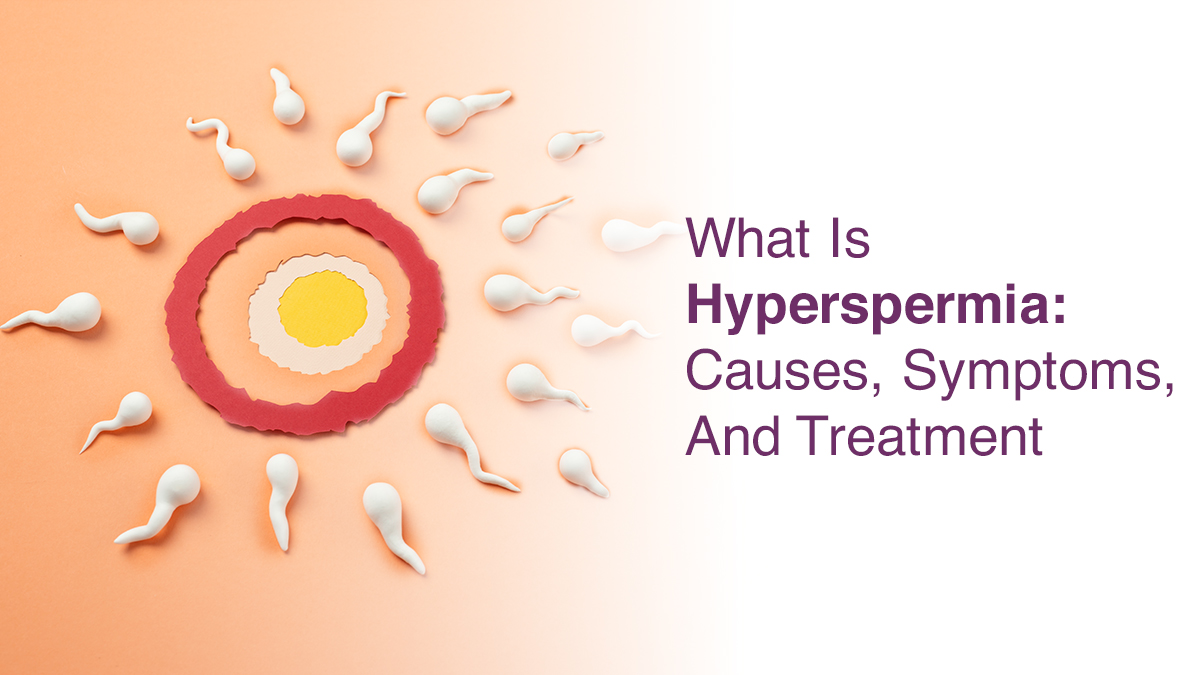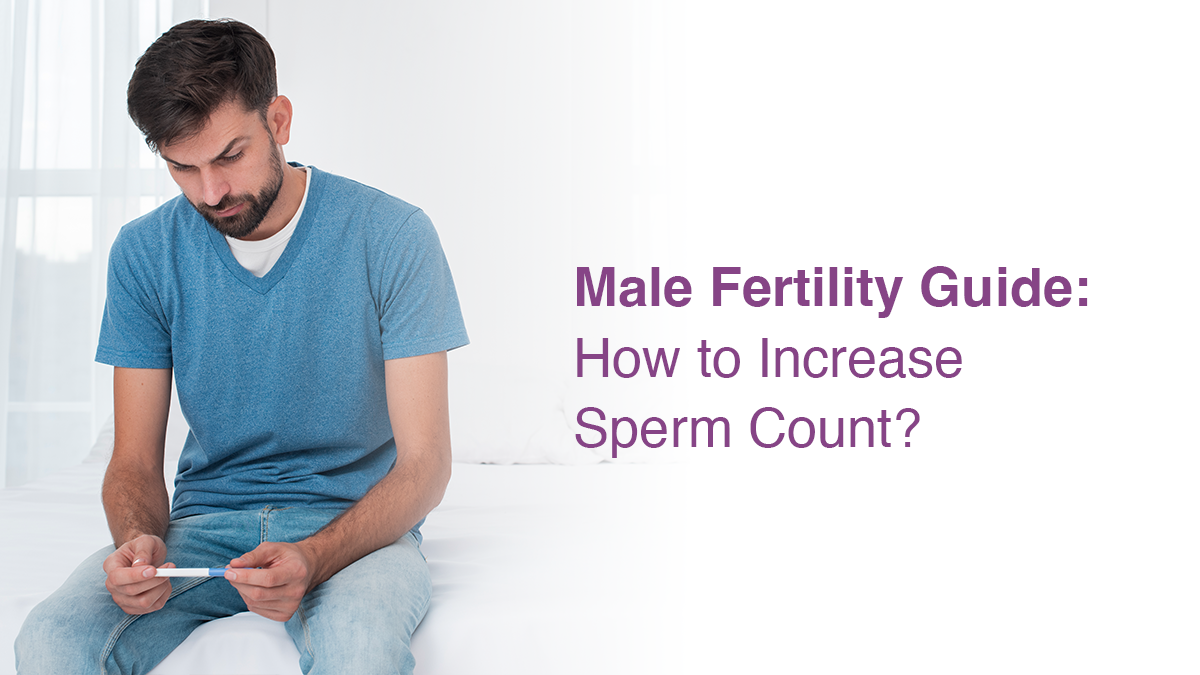
What Is Hyperspermia: Causes, Symptoms and Treatment

If a man is unable to conceive after a year of consistent, unprotected sexual activity, it is known as male infertility. Sperm count and fertility are majorly connected with each other. Some of the other causes include a poor sperm motility, atypical sperm morphology or reproductive system obstructions. Age, lifestyle variables like obesity or smoking, and hormonal imbalances might also play a role. Additionally, sperm count and fertility are also connected with each other. Hyperspermia, or an excess of semen volume, is sometimes associated with male infertility. It can dilute sperm concentration, which may impact fertility and reduce the likelihood of successful fertilization, even if it may not always decrease sperm quality.
Causes of Hyperspermia
What is Hyperspermia? It occurs when a man produces more semen than usual. The fluid ejaculated by males during an orgasm is called semen. Along with prostate gland fluid, it contains sperm. A man’s health is not adversely affected by hyperspermia. But it might make him less fertile.
Let’s look at some of the hyperspermia causes:
How are sperm volume and fertility linked to each other? It is not yet known what specifically causes an abnormal sperm count. Nonetheless, it is believed to be brought on by the following factors:
- Utilization of certain drugs
- The interval between sexual activity
- Prostate infection
- Pills used to improve sexual performance
- Steroid use
- Consumption of foods high in protein and fibre
Symptoms of Hyperspermia
Here are some of the symptoms of hyperspermia:
- Ejaculation delay
- Anguish when ejaculating
- Weakness or exhaustion after sexual activity
- Post-sex dizziness
- Increased sexual desire
- How flexible the penis is
- The sperm released were yellow in colour
Diagnosis of Hyperspermia
Fertility specialists will do several tests to assess the male patient’s reproductive system and the quality of the semen produced to accurately diagnose hyperspermia.
Physical Assessment
To rule out any reproductive anomalies, a skilled physician will perform a physical examination, just like with any other possible medical ailment.
Hormone Tests
Hormone tests can determine whether the problem known as hyperspermia is caused by low testosterone levels. Any anomalies in the bloodstream or hormone synthesis will be discovered.
Imaging Examinations
To identify any harmful factors affecting the male reproductive system’s anatomy that contribute to infertility, an ultrasound or other imaging test may be conducted.
Analysis of Semen
In addition to analysing count, motility, quality, and other relevant semen parameters, a semen analysis test can identify any problems with the sperm.
Treatment Options for Hyperspermia
Let’s look at numerous Hyperspermia treatment choices:
Treating Underlying Diseases
Treating underlying medical conditions causing hyperspermia, such as hormone imbalances or prostate issues, may be part of the treatment.
Medications
In certain cases, medications may be prescribed to regulate hormone levels or address hyperspermia symptoms.
Lifestyle Modifications
Improving reproductive health through a healthy diet, regular exercise, and limiting alcohol and tobacco use can be beneficial.
Fertility Counselling and Assisted Reproductive Technologies
For individuals concerned about infertility due to hyperspermia, fertility counselling and treatments like IVF or IUI may be helpful.
Impact of Hyperspermia on Fertility
How are hyperspermia and fertility connected? Low fertility can occasionally be caused by hyperspermia. Since other fluids in the semen dilute the levels, some men with high semen volumes may have less sperm than usual in their ejaculate. Fertility is adversely affected by this dilution. However, a low sperm count does not always indicate infertility. Fertility problems are usually not present in people with hyperspermia whose ejaculate contains normal to high levels of sperm. Thick sperm and fertility can be vital for hyperspermia, as excessive semen may affect sperm quality and motility. This can potentially impact fertility.
When to Seek Medical Advice
After a year of unprotected intercourse that does not lead to pregnancy, couples who are attempting to conceive are often advised to consult a doctor. After six months of unprotected intercourse that does not result in pregnancy, consult a physician if the female partner is older than 35. You should see a doctor as soon as possible before starting a fertility attempt if you have a known job, pastime, or health issue that is associated with a decreased sperm count. To make sure you’re healthy and to recommend conception, they can perform testing.
Related Read: How to Know if You Need a Male Fertility Check
A fertility specialist will typically conduct tests on both the male partner as well as the female partner if the couple is facing challenges in naturally conceiving. The uterus, ovaries, and eggs of a woman will be examined. For a sperm count and semen analysis, a male will supply a sample of his semen. To ascertain whether the sperm count is too low, the physician will count the quantity of sperm in each sample. To check for issues with the scrotum or the ducts and tubes that carry semen, an ultrasound may also be done.
Conclusion
The likelihood of getting pregnant with a low sperm count will depend on the health of both you and your spouse. You have a lot of alternatives if you decide you want a family, looking into IVF, or changing your lifestyle to attempt to conceive. Before creating a plan, you can consult the fertility specialists at an Oasis Fertility Clinic near youwho are equipped with the right skills and expertise to help determine your sperm count and discuss other fertility-related concerns. You can also contact 1800-3001-1000 to engage in a live chat for prompt assistance.


fill up the form to get a
Free Consultation
Avail 0% interest on EMI
All Procedures | No Upper Limit
How we reviewed this article:
- Current Version
- January 7, 2025 by Oasis Fertility






